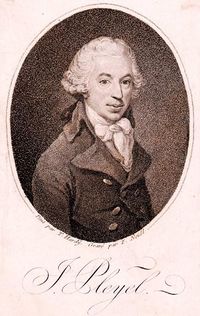Annotation:Duke of York’s Favourite: Difference between revisions
No edit summary |
No edit summary |
||
| (3 intermediate revisions by 2 users not shown) | |||
| Line 1: | Line 1: | ||
---------- | |||
---- | {{TuneAnnotation | ||
|f_tune_annotation_title= https://tunearch.org/wiki/Annotation:Duke_of_York's_Favourite > | |||
'''DUKE OF YORK'S FAVOURITE.''' Scottish, March (2/4 time). B Flat Major (Watlen): G Major (Aird). Standard tuning (fiddle). AABAA. John Watlen, in his '''Celebrated Circus Tunes''' (Edinburgh, 1791) attributes the tune to composer Ignaz Pleyel | |f_annotation='''DUKE OF YORK'S FAVOURITE.''' Scottish, March (2/4 time). B Flat Major (Watlen): G Major (Aird). Standard tuning (fiddle). AABAA. John Watlen, in his '''Celebrated Circus Tunes''' (Edinburgh, 1791) attributes the tune to composer [[wikipedia:Ignaz Pleyel|Ignaz Pleyel]] (1757-1831), born in Austria, who became a French citizen around the beginning of the Republic, and who managed to negotiate those troubled times, even though accused at one time of being a Royalist agent. When the revolutionaries in France banned public concerts and music in church in 1791, Pleyel sought employment in London, where he stayed for a few years, leading concerts in that city (as did his old teacher, [[wikipedia:Joseph Haydn|Joseph Haydn]], with whom he remained cordial). | ||
[[File:pleyel. | [[File:pleyel.jpeg|200px|thumb|left|Ignaz Pleyel]] | ||
|f_source_for_notated_version= | |||
|f_printed_sources= Aird ('''Selection of Scotch, English, Irish and Foreign Airs, vol. 4'''), 1796; No. 130, p. 50. Watlen ('''The Celebrated Circus Tunes'''), 1791; p. 30. | |||
|f_recorded_sources= | |||
|f_see_also_listing= | |||
}} | |||
Latest revision as of 21:42, 15 May 2024
X:1 T:Duke of York's Favourite M:2/4 L:1/8 R:Reel C:"by Pleyel" Q:"Allegro" B:John Watlen - The Celebrated Circus Tunes (Edinburgh, 1791, p. 30) Z:AK/Fiddler's Companion K:Bb (B/c/d/e/) (f/d/e/g/)|fd B2|(A/B/c/d/) (e/c/d/B/)|cA F2| (B/c/d/e/) (f/d/e/g/)|fb d'2|(c'/d'/c'/b/) (a/b/c'/b/)|bb b2:| b/a/).b.f dd|(f/=e/).f/.d/ BB|(A/B/c/d/) (_e/c/d/B/)|cf F2| (b/a/).b/.f/dd|(f/=e/).f/.d/.BB|(=e/f/g/a/) (b/g/a/e/)|(f/e/f/g/) (f/_e/d/c/)!D.C.!||
DUKE OF YORK'S FAVOURITE. Scottish, March (2/4 time). B Flat Major (Watlen): G Major (Aird). Standard tuning (fiddle). AABAA. John Watlen, in his Celebrated Circus Tunes (Edinburgh, 1791) attributes the tune to composer Ignaz Pleyel (1757-1831), born in Austria, who became a French citizen around the beginning of the Republic, and who managed to negotiate those troubled times, even though accused at one time of being a Royalist agent. When the revolutionaries in France banned public concerts and music in church in 1791, Pleyel sought employment in London, where he stayed for a few years, leading concerts in that city (as did his old teacher, Joseph Haydn, with whom he remained cordial).


